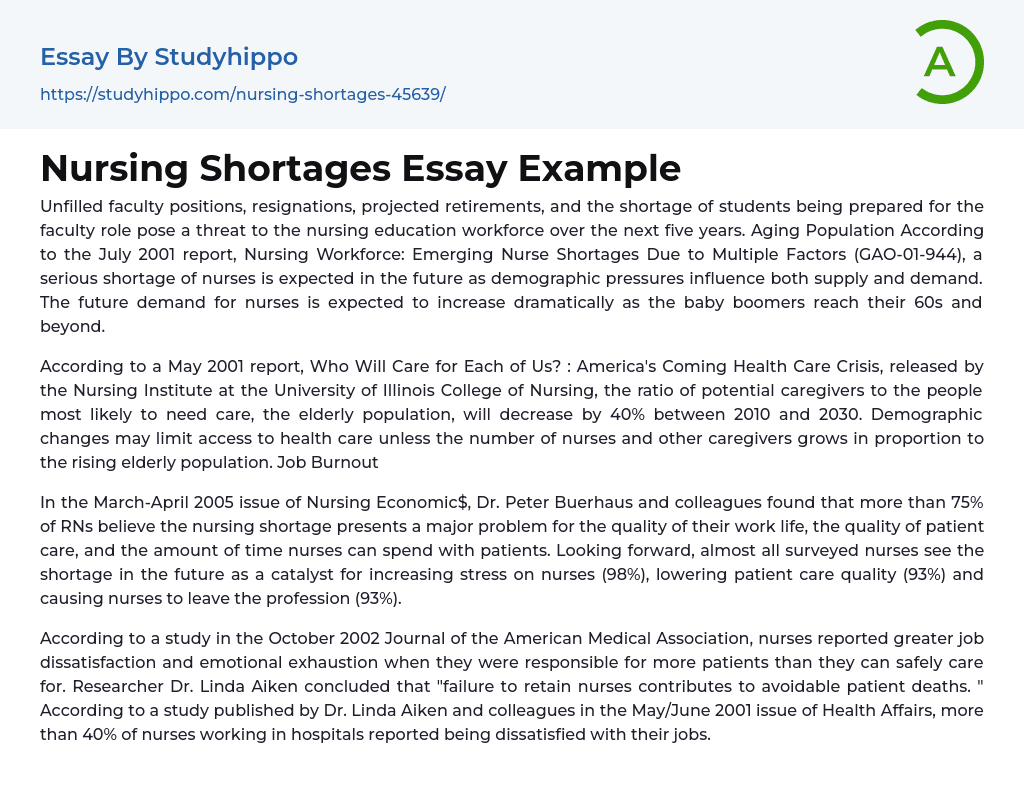The nursing education workforce is encountering difficulties in the next five years because of various factors such as unfilled faculty positions, resignations, projected retirements, and a shortage of students preparing for the faculty role. According to the report Nursing Workforce: Emerging Nurse Shortages Due to Multiple Factors (GAO-01-944) published in July 2001, the aging population will greatly contribute to a significant scarcity of nurses in the future. The demand and supply for nurses are anticipated to rise significantly as the baby boomers reach their 60s and beyond.
In May 2001, the Nursing Institute at the University of Illinois College of Nursing published a report titled "Who Will Care for Each of Us? : America's Coming Health Care Crisis". The report predicts that between 2010 and 2030, there will be a significant decline of 40% in the r
...atio of potential caregivers to the elderly population, who are expected to require care. It emphasizes the need for an increase in nurses and other caregivers to meet the demands of this growing elderly population so as not to limit access to healthcare due to demographic changes. Additionally, job burnout is highlighted as another concern.
A study published in Nursing Economic$ in March-April 2005 revealed that more than 75% of registered nurses (RNs) consider the nursing shortage as a crucial problem impacting their work life, patient care quality, and the amount of time they can devote to patients. The research indicates that nearly all surveyed nurses predict that the shortage will result in heightened stress levels (98%), a decrease in patient care quality (93%), and a significant number of nurses leaving the profession (93%).
According to a stud
published in the October 2002 Journal of the American Medical Association, nurses who were given more patients than they could safely handle experienced higher levels of job dissatisfaction and emotional exhaustion. The researcher, Dr. Linda Aiken, also concluded that this lack of nurse retention leads to preventable patient deaths. Another study by Dr. Linda Aiken and colleagues in the May/June 2001 issue of Health Affairs found that over 40% of hospital-employed nurses expressed dissatisfaction with their jobs.
- Hospital essays
- Physician essays
- Health Care Provider essays
- Universal Health Care essays
- Readmission essays
- Cloning essays
- Medical Ethics essays
- Patient essays
- Therapy essays
- drugs essays
- Cannabis essays
- Aspirin essays
- Cardiology essays
- Hemoglobin essays
- Pharmacology essays
- Surgery essays
- alternative medicine essays
- Plastic Surgery essays
- Organ Donation essays
- Vaccines essays
- Medical essays
- Dentist essays
- Psychological Trauma essays
- Physical therapy essays
- Cold essays
- Cocaine essays
- Why Marijuana Should Be Legalized essays
- Drug Abuse essays
- Teenage Drug Abuse essays
- Heart Disease essays
- Artery essays
- Psychometrics essays
- Measure essays
- Why I Want to Be a Nurse essays
- Nursing Profession essays
- Why Did You Choose Nursing essays
- Addiction essays
- Anatomy and Physiology essays
- Biodegradation essays
- Cancer essays
- Dental Care essays
- Disability essays
- Disease essays
- Disorders essays
- Health Care essays
- Infectious Disease essays
- Inquiry essays
- Intelligence Quotient essays
- Lung Cancer essays
- Medicine essays




